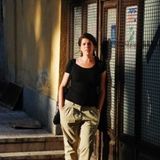In the report ‘Moslima’s in kranten’, photographer Cigdem Yuksel and researcher Ewoud Butter analysed the way in which veiled Muslim women were depicted in photographs in Dutch newspapers over the past twenty years. They concluded that Muslim women are predominantly portrayed as crying, fleeing, demonstrating or oppressed women.
Now that the world around us continues to digitize rapidly, the question arises as to what extent we can influence imaging in the future. Because what happens if not image makers, such as illustrators or photographers make images, but AI-driven tools? What will the work of an architect, artist, designer or journalist look like in the future? A known bug in the system behind AI is that it forms and feeds on existing databases. Databases that have proven to be one-sided and discriminatory. What consequences does this have for future image making and how can we deal with it?
In this final programme of ‘Moslima’, we’ll discuss the influence of artificial intelligence and digitization on our future perception. We look at it’s impact on socially marginalised groups and professional groups such as photographers and newsmakers.
Dates and water are offered to people who are fasting during Ramadan to break the fast during this programme.







About the speakers
Laurens Vreekamp is a journalist, design thinker and founder of the Future Journalism Today Academy. He worked as a Teaching Fellow at Google’s News Lab and was a lecturer-researcher UX Design at Hogeschool Utrecht. He was elected Teacher of the Year in 2013. Laurens has worked as a researcher, teacher and designer with RTL Nieuws, Nu.nl, dentsuAegis, the FD, NPO Radio 1 and the KRO-NCRV, among others. Graduated cum laude in 2003 as European Media Master of Arts in Interactive Media (2003) from the University of Portsmouth. Since 2022, he is a member of the Council of Europe Expert Group on Enhancing Media Resilience (MSI-RES).
Babusi Nyoni is a Zimbabwean creative technologist who develops new work at the nexus of emerging technology and the needs of underrepresented communities. He is praised for having created the first machine learning model for the classification of black women’s hair as well as for creating various interactive media experiences that interrogate the uses of new technologies while centering their early applications on the requisites of often-marginalised communities.
triple.black
Joumana El Zein Khoury is the executive director of the World Press Photo Foundation. She has over 15 years of experience in international cultural exchange, developing programs and fostering new talent. She was previously the director of the Prince Claus Fund, an internationally renowned institution supporting culture under pressure, where she was crucial to strengthening fundraising capabilities. Joumana has also worked with organizations including the Arab Image Foundation and the Baalbeck Festival. She is a member of the supervisory board of Manifesta.
Cigdem Yuksel is a photographer who won the prestigious Silver Camera prize in 2016 with her poignant portrait series of Syrian refugee children who worked in shoe factories in Turkey. She made the photo series A New Beginning as part of the transmedia project Shadow Game, which is now exhibited all over the country and was also shown in New York during the prestigious Photoville festival. She researched our collective visual memory and the visual representation of Muslim women in the Netherlands. This resulted, among other things, in a much-discussed research report from 2020 on the representation of Muslim women in the image bank of the ANP. She questions both the historical archive and the collective visual memory in the Netherlands. Who decides which photos and stories end up in our archive and which do not? Why is that and how can visual memory be supplemented?
Merel Bem studied art history at the University of Amsterdam and New York University. Since 2000 she has been writing about visual art, photography and clothing for de Volkskrant and various magazines and publications. For the past five years she has been presenting de Volkskrant column ‘Imagers’ every other week, about imaging and the way in which photography determines our view of reality. In 2016, her first book was published: Doorkijken. Kunst voor het dagelijks leven (De Bezige Bij), about the role that visual art plays in her personal life. In the same year, Dit boek gaat niet over mode (Atlas Contact) was also published, a collection about clothing and why people wear what they wear. From 2018 to 2021, she served as jury chairperson of the Steenbergen Stipendium, a Dutch prize for recently graduated photography students.
Roosje Klap researches the experimental boundaries of custom fit design through close collaborations with artists, curators, architects, (type) designers, and writers. With the group of ARK (Atelier Roosje Klap) their research-based interdisciplinary approach is reflective of a generation of designers that define their assignments alongside commissions. As an experienced educator and coach specializing in graphic design, media art, and digital humanities, Roosje led and designed curricula and workshops for international art academies and universities to guide and inspire creatives and enhance equitable relationships in their habitats.In 2022, ARK won the Golden Calf for Best Digital Cultural Production at the Netherlands Film Festival.
Oumaima Hajri is a researcher and lectures at the Hogeschool Rotterdam and her work focuses on the intersection of AI, ethics and society. For the Designing Responsible AI Media Applications project, she is investigating, in collaboration with media organizations, how AI can be applied in a responsible manner. She also deals with regulations (such as the AI Act), in particular how ethical guidelines can make an important contribution in translating strategic interventions into practice. She is currently part of the first cohort of the Master studies AI Ethics & Society at the University of Cambridge, where she conducts research on the social impact of AI, mainly focusing on decolonization and demystification.











